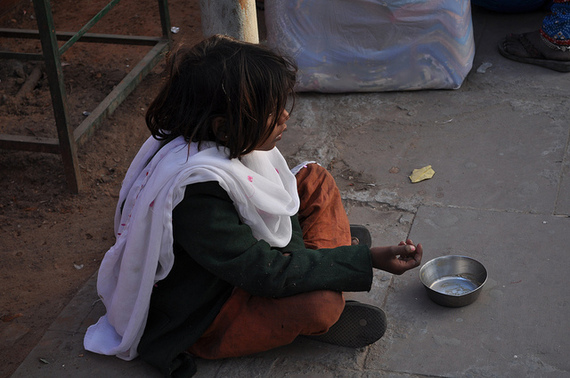Many years ago, while I lived in India, I discovered that misery -- and the difference between an optimist and a pessimist is quite often a relative issue. It pained me to see the poor women with babies begging at the traffic lights in New Delhi. There were just too many of them. You could help one, a few, but never all. In my frustration I used to think that The Netherlands was a great country because it had a social security system that would prevent such painful begging.
Then I would travel back to The Netherlands and in public transit I would find jobless men and women supported by that very social security system looking as sad and frustrated as the poor women in India. Sometimes there even seemed to be more smiles at the traffic lights in New Delhi.
I concluded that the way we feel about our lives is greatly influenced by the way we relate to our environment. To a beggar in India, social security in The Netherlands must be heaven. To an unemployed person in The Netherlands a job and the social standing that comes with it is heaven too. Both are struggling, trying and not succeeding to keep up with the Joneses.
The best way to improve your life is not to compare yourself with others. Such comparing is at the root of a lot of pessimism.
In the 1940s, the American theologian Rienhold Niebuhr wrote a prayer that has since been on many walls. He asked for the serenity to accept what can't be changed, the courage to change what can be changed, and the wisdom to differentiate between the two.
Niebuhr's inspiring words direct us to ourselves. It's about what we can and cannot change in any given situation. That's an empowering perspective and that's surely the shortest way to a better life. A lifestyle of optimism begins where we are able to choose our own response to the challenges that life deals us.
A friend once told me about a talk by a professor in psychology who had therapy practice. The man said that all therapy ends with self-acceptance. "I consider therapy a success when the consultation room is empty and when it's just my client and me. In the beginning the room is full with others, parents, siblings, lovers, employers and colleagues..."
In other words happiness flows from the acceptance that we lead our own lives and create our own experiences. And that we can under all circumstances choose the optimal response available to us. I'm sure there were optimists among the begging women in New Delhi -- those were the ones with the smiling faces -- and they have since found a better future for themselves and their children. Similarly, the unemployed people who find a new job sooner are not just lucky. It pays off to be an optimist. It's the way to more success and happiness and better health. Give it a try.

